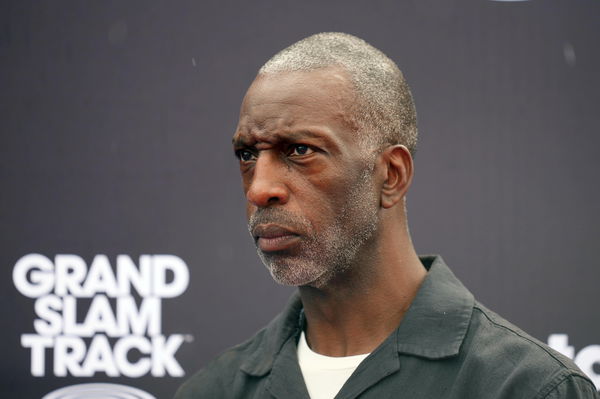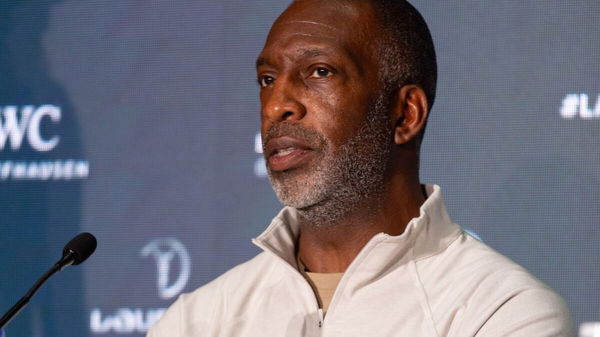
Imago
Credit: Imago

Imago
Credit: Imago
Michael Johnson’s brainchild, Grand Slam Track, had its grand finale pulled just days before its scheduled launch in Los Angeles. But what was once described as a bold leap for the sport has unraveled into a financial mess. On Thursday, Johnson is set to face the music—this time on the Ready Set Go podcast, marking only his second public appearance since the turmoil began. For many in the athletics world, this will be less of an interview and more of a reckoning.
Watch What’s Trending Now!
The LA meet, slated for June 28–29 at UCLA’s Drake Stadium, was abruptly canceled. Johnson and his team quietly pulled the plug without offering athletes or fans any formal explanation for weeks. Behind closed doors, Zoom calls were held, and damage control was underway. The event’s cancellation reportedly saved the league over £2.2 million in prize payouts and logistical costs. But the real story wasn’t just about one meet, it was about a league teetering on the edge of insolvency.
ADVERTISEMENT
On Front Office Sports Today, Johnson finally addressed what he called a “very difficult situation financially.” Citing the sudden withdrawal of an investor who had pledged an eight-figure term sheet, Johnson said, “We had an investor who wasn’t able to honor their complete commitment to the league. We started with the capital that we needed to get through the season as we planned it with four slams. And to make sure we can take care of everyone.” Despite initial claims of $30 million in backing, findings reveal a very different picture: unpaid appearance fees, missing prize money totaling over $13 million, and at least $90,000 in unpaid facility charges from the Miami event alone. Athletes, left in the dark for weeks, have begun voicing their frustration privately, while World Athletics President Sebastian Coe publicly acknowledged the gravity of the situation, stating, “The athletes do need paying.”
Johnson offered a mixture of candor and regret about how things spiraled. “We probably went too fast,” he said. The league’s four-meet schedule, each spaced a month apart, left no margin for error. Philadelphia’s meeting barely happened, with board member Robert Smith reportedly intervening at the last moment. The league’s silence since—no social media posts since mid-July and a mass exodus of senior staff- has only deepened suspicions about whether Grand Slam Track can resurface in 2026 as promised.
ADVERTISEMENT

Imago
Track & Field: Grand Slam Track Miami May 4, 2025 Miramar, FL, USA Michael Johnson reacts during the Grand Slam Track Miami at Ansin Sports Complex. Miramar Ansin Sports Complex Florida United States, EDITORIAL USE ONLY PUBLICATIONxINxGERxSUIxAUTxONLY Copyright: xKirbyxLeex 20250504_hlf_al2_126
Despite all that, Johnson continues to maintain a belief in the long-term mission. He insisted that fundraising efforts are still underway and that the organization is working to settle its debts. “It’s what I do every day. It’s what I wake up every morning thinking about,” he said. But fans, athletes, and sponsors alike are still waiting for tangible action, not just words.
ADVERTISEMENT
Fans can’t wait for Michael Johnson to steps back into spotlight as Grand Slam Track fallout deepens
Michael Johnson’s decision to appear on Ready Set Go shows he’s not dodging public scrutiny. As one fan put it, “Good on him for doing it and not avoiding public appearances.” After weeks of silence post-LA cancellation, this podcast marks only his second outing, offering a rare chance for accountability and reinforcing why fans are watching closely for real answers.
ADVERTISEMENT
The fan who said, “MJ tried to do something about the lack of enthusiasm for track and field in the US market,” highlights the original ambition behind Grand Slam Track. Johnson’s bold, fast-paced schedule aimed to energize the sport, but logistical missteps and a thin financial cushion exposed its flaws, validating fans’ hopes but also their concern for GST’s viability.
ADVERTISEMENT

“They said that athletes would receive their first payment at the end of July. Has this been the case?”, a question now front and center. With over $13 million in prize money still reportedly unpaid, Johnson’s upcoming appearance must address whether those July promises were fulfilled or if delays continue. It’s a major test of GST’s credibility.
ADVERTISEMENT
One fan speculated, “Perhaps that’s what he’s going to announce on the podcast.” After weeks of financial damage control and vague fundraising talk, Johnson’s second appearance could reveal whether GST has secured short-term funds. A public declaration about settling debts would be a significant shift from the silence since mid-July.
“Lol wonder how tough they’ll really be.” This remark cuts into the credibility of the podcast format itself. With Johnson choosing a controlled setting rather than a press conference, fans are skeptical whether tough questions, about the investor fallout, athlete payments, and staff departures, will truly be asked or just skirted. Thursday’s podcast appearance won’t fix Grand Slam Track’s problems, but it will likely offer a clearer window into how the league crumbled so quickly, and whether Johnson truly has a roadmap for salvaging its future.
ADVERTISEMENT
ADVERTISEMENT
ADVERTISEMENT
ADVERTISEMENT